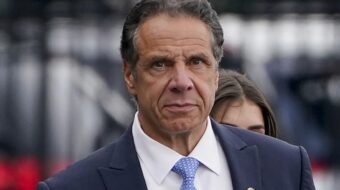Against the background of the bloodiest century in human history and this decade of war, genocide, boycotts, and threats and counter threats, thanks in large measure to the Bush administration and, in a larger sense, our own imperialism, humanity is seeking a new world order in which peace and justice are its organizing principles.
The vast majority of people desire the easing of tensions, an end to violence, and the normalization of relations between states. They want dialogue and negotiation, not war and threats. And, not surprisingly, they hope that the U.S. government will choose a constructive role in world affairs.
President Obama has captured this sentiment well in several speeches before vast audiences. His emphasis on human solidarity, diplomacy, cooperation, and peaceful settlement of explosive issues is striking an emotional chord worldwide.
The president has expressed a readiness to engage with countries that the Bush administration considered mortal enemies – Iran, Cuba, Venezuela, North Korea, and others.
In Latin America, he indicated that the administration would like to put relations between our government and others in the region on a different footing. In a historic speech in Prague, he voiced his desire to reduce and ultimately abolish nuclear weapons. Earlier this month, in an unprecedented address in Cairo he indicated his eagerness to reset relations with the Muslim world, sit down with the Iranian government, and press for a two state solution to the Palestinian-Israeli conflict.
A few weeks ago, he quietly made his allegiances clear with regard to the social explosion in Iran, but not in a way that would play in to the hands of the ruling reactionary regime or cut off a developing dialogue with the regime. And only last week, he condemned the coup-d’etat in Honduras – a declaration that the previous administration would never have done.
While the administration has yet to fully match its words with practical deeds, what it has said and done so far constitutes a qualitative turn compared to the previous administration. Nevertheless, more needs doing before we are on a distinctly new course.
In Afghanistan and North Korea, a negotiated solution to both conflicts that includes increased economic and humanitarian aid is urgently needed. Military occupation and troop buildup in Afghanistan and the imposition of sanctions against North Korea are extremely dangerous and will postpone any resolution of those crises. To go further, if one or the other (or both) metastasizes into a bigger conflict, it could be the undoing of this administration.
Don’t get me wrong: terrorist activities and nuclear proliferation are both enormous dangers, but the solutions to these have to be sought along other lines and involve regional and international players.
In Iraq, the U.S. withdrawal plan is proceeding, with the first stage being withdrawal from Iraqi cities by July. President Obama has reiterated his intention to stick with the pullout deadlines. Even with the caveats about what U.S. forces might remain, this is a major victory for the peace movement. The struggle over what forces remain will depend in large part on the Iraqi people’s democratic and progressive forces, as well as our own peace movement.
In the Palestinian-Israeli conflict, Netanyahu, in an about-face, said he could live with a two-state solution. And even with all the caveats and demagogy surrounding the “concession,” I believe that it signifies recognition, albeit forced, on Likud’s part that public opinion is shifting against them in Israel, Europe, and the U.S.
In this country the peace movement has to note particularly the changing dynamics in U.S. opinion, including in the White House, Congress, and among Jewish members of Congress.
Netanyahu got a different reaction than he expected when he met with Congressional leaders when he was in Washington recently. While he wanted to focus on Iran, they pressed him on the settlements. And, that pressure will only grow if the new Israeli government continues to pursue its present policy.
As far as Cuba is concerned, we are at a crucial moment in U.S.-Cuba relations. The Obama administration has indicated its readiness to reset relations with Cuba and has taken some very modest steps in words and deeds in that direction. But obviously much more needs to be done to end all travel restrictions, lift the blockade, resume trade, and free the Cuban 5, who languish in maximum security prisons. That said, the good news is that diverse groups have an interest in normalizing the relations between our two countries, including in the Congress.
Finally, we are in a moment when our ability to change our foreign policy will bear directly on our capacity to address economic and social problems at home. Currently, 53 percent of the discretionary spending of the federal budget goes to the military.
Thus, ending wars, closing military bases, and cutting military spending coupled with diplomacy, cooperation, and respect for international law and national sovereignty is good economic as well as good foreign policy.
But there is a hitch. Both Republicans and some Democrats are upset at even the minimal steps by the administration to cut useless weapons systems.
So peace minded people have a struggle on their hands. And it will be fought out in “the court of public opinion,” at the ballot box, and in the economic trenches.










